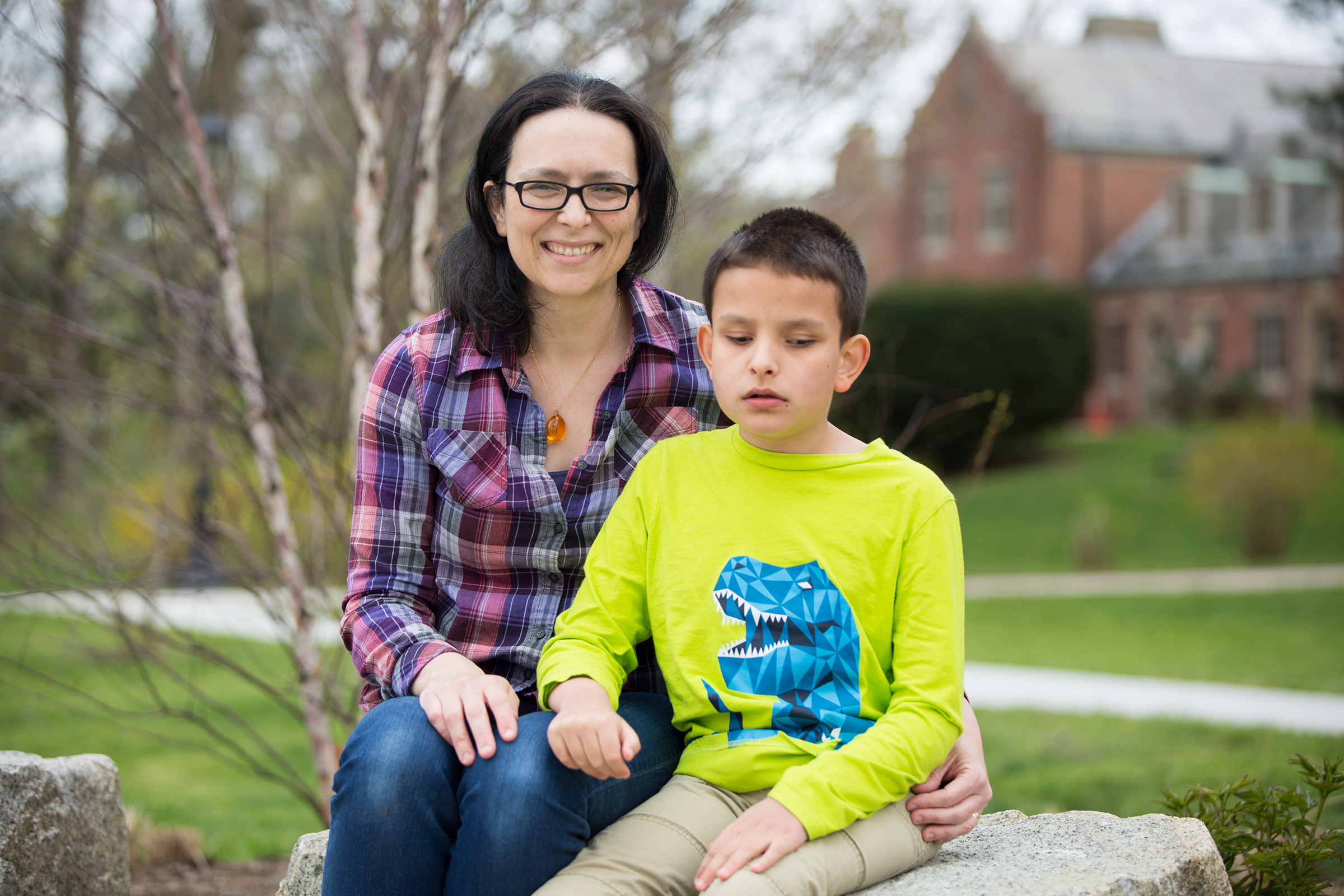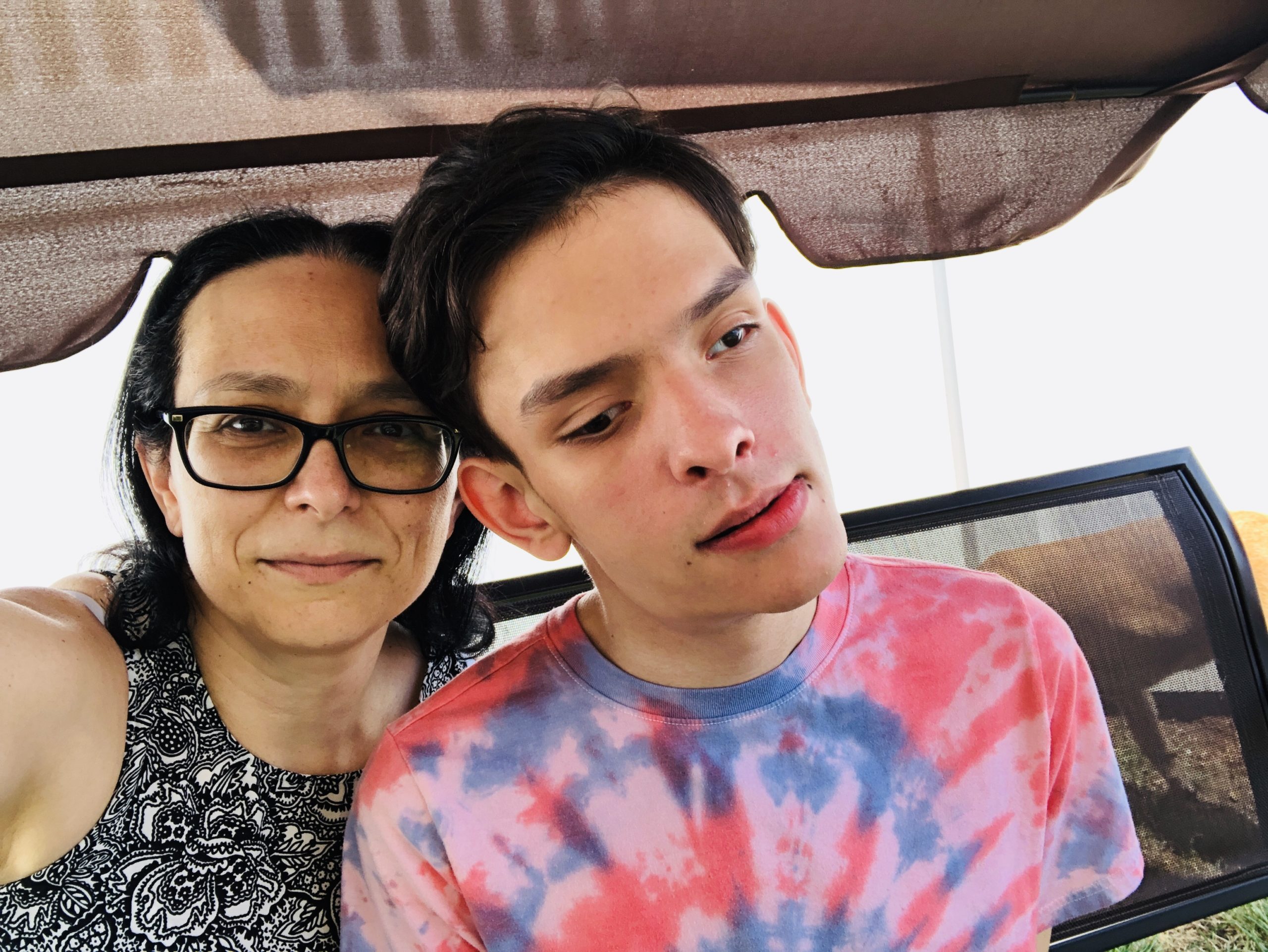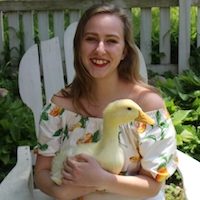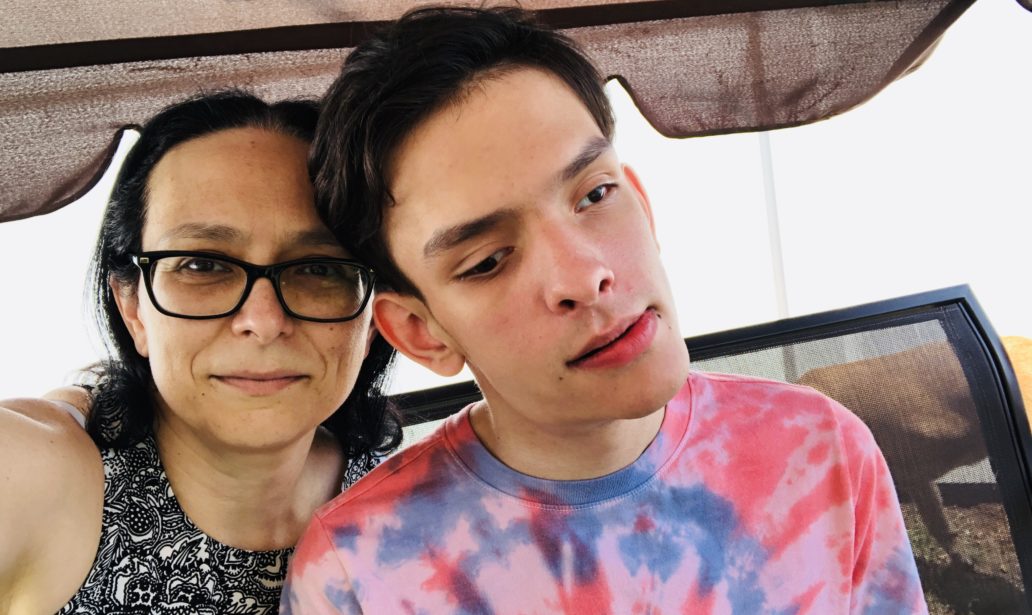Amber Bobnar is the founder of WonderBaby.org, a website dedicated to sharing resources for families with children with visual impairments and children with multiple disabilities. She started the blog 15 years ago during the process of receiving diagnoses for her son Ivan, who is blind.
We caught up with Amber to talk about Ivan, what communication looks like for them, their family’s experience navigating diagnoses and resources, and her inspiration behind WonderBaby.
Please introduce yourself and tell me a little bit about your family.
My name is Amber and I’m mom to Ivan, who is 16 years old today. It’s his birthday! It’s a big one. We live just right outside of Boston– we’re in the city.
He has multiple disabilities. He’s totally blind—he has Leber’s Congenital Amaurosis (LCA), retinal degeneration from birth, so he has no light perception. He also has refractory epilepsy. He has multiple seizures a day, every day. Then he also has a respiratory disorder and he has to do respiratory treatment a couple of times a day. And he has Joubert Syndrome, which is a neurological disorder that causes low muscle tone, so he’s in a wheelchair. He can’t walk on his own, but he does okay with assistance.
It’s just me and Ivan and his dad. He doesn’t have any siblings. He does have one cat and one dog that absolutely dote on him and help with all of his treatments. I want to write more about how important animals are in a kid’s life. They’re always right there.

Do you mind telling me a little bit about the process of receiving Ivan’s diagnoses?
It was difficult. We’re originally from Hawaii, born and raised. I don’t think it’s necessarily gotten all that much better now, but especially 16 years ago, there wasn’t a lot available there. We didn’t live on the main island or in the city–we were in a very rural part of the state. There was one pediatric neurologist in the entire state, and it wasn’t on the island we were on. So getting a diagnosis there was pretty much impossible.
We ended up going to an LCA conference in Cleveland when he was about a year old. We were able to meet with some of the expert doctors there who looked at his retina and they gave him a diagnosis. But genetic diagnoses and neurological diagnoses didn’t come until we moved to Boston and were able to access better medical care.
So in the beginning, a lot of it was just searching for symptoms online and putting things together ourselves. Bringing things to doctors and saying, “Okay, I read about this thing. Can you tell me about it or tell me if there’s a test for it?” Especially when you’re dealing with congenital disabilities, I mean, they’re babies. They can’t tell you how they’re feeling, or what their symptoms are. And whatever it is, it’s generally so rare that it’s hard to get that diagnosis. It can take years.
It sounds like you frequently have to be your own advocate and your child’s advocate: what have you learned about that, and have you changed your approach at all over the years?
I was pretty convinced that he had LCA from the beginning and was told by multiple doctors that he didn’t. And I was also fairly convinced he had Joubert Syndrome in the beginning, and I was told by multiple doctors that he didn’t. Doctors are experts, and they have their degrees and they’re smart, but they’re not always right. It’s okay to question them and it’s okay to look for a second opinion. Which can also be really difficult when the first opinion might be what you want to hear, you know? But if you feel like there’s something going on, there’s probably something going on.
With him being our first child and me being not at all familiar with the world of disability, it’s hard to even know what to advocate for. If you don’t have a robust system that can kind of pick you up and say, “This is what you need, this is what we can offer,” it’s a lot harder to fight for it.
Part of what we research is how sensory input can impact how kids learn language, and the ways that communication and language can look different for different folks. Do you mind telling me a little bit more about what communication looks like for you and your son?
It’s complicated. He actually did speak when he was younger, but then as the seizures developed and the epilepsy got worse, he lost his language, which was really hard to see. We’re far along on that journey now, but he was a good talker.
Losing his language and then trying to find ways to control his epilepsy, there was definitely a period where it was really hard to get through to him at all. I don’t even know that he was processing sounds well for a while.
Where he’s at now though, he definitely hears us and he definitely understands a lot of what we say. He has a lot of fine motor skill and motor planning issues, so it’s really difficult for him to use an output device. But he’ll light up and smile or he’ll reach out and touch you, you know that there’s communication going on there.
During COVID we were doing speech therapy virtually, which actually worked out a lot better than I thought it would.
[Ivan’s speech therapist] introduced us to an app on the iPad called Pictello, which is essentially a storytelling app that can connect to a switch device. I learned that he loves to tell stories about himself, which is not something that I knew about him until we started doing the speech therapy at home. We’ve done an introduction to Ivan: things he likes, things he doesn’t like, stories about his pets, stories about his family. There’s a text to speech feature and he has to hit the switch so it will read it out for him, and when he gets to the end of the page, he has to hit the switch to turn the page. It’s been incredibly motivating for him.
I started thinking, when you have, say, spring break, usually you go back to school and the first thing everybody says is, “oh, how was your break? What did you do while you were home for the week?” Which he can’t communicate. So during the week, every day we would sit down and put a page into the storybook. And then at the end of the week, when he goes back to school, all I have to do is email the code to his teacher. Then she can say, “okay, Ivan. What’d you do over spring break?” And he can hit that switch and everybody gets to see what he did.
Is there anything that you wish people knew about your son?
Ivan is very social. He’s a handsome kid and he’s 16 years old now, and people do approach him more and talk directly to him, which I think is really nice.
Even if somebody can’t necessarily talk back or respond, I think for the most part, people understand that you can still talk to him and include him. And I think that that’s also really important for people to understand.

What does accessibility look like to you and your family?
I mean, there’s so many aspects of accessibility, right? In terms of technology and wheelchair access and things like that.
But honestly, I think the biggest thing is just acceptance and flexibility. For example, he used to have a gym membership to go to the pool before COVID. He’s just finished his second round of vaccinations, so we think we’re going to be going back to the pool.
But a lot of gyms still have a mask requirement. He can’t wear a mask, he won’t wear a mask, he doesn’t understand the mask. You try and put it on– it comes right off. So, you know, a big part of accessibility is just being able to say, “this particular person cannot wear a mask and we’re going to be okay with that.”
Or also at pools: we used to go to the YMCA when he was little. And then he reached a certain age where boys aren’t allowed in the girl’s locker room, but he can’t change himself. And suddenly we weren’t allowed in the YMCA anymore because I couldn’t change him. They had a family changing room that was like on the other side of the building, three floors down, but I’m not going to take him, wet, through that elevator, you know? In that case, technically it was accessible. But it would have been a lot easier if you’d just let me take him into a little room in the women’s locker room.
Being open to thinking outside the box, figuring out how to make things work, and being flexible. It goes a long way for accessibility.
I’m sure a lot of people, like disabled folks, or parents of kids with disabilities can relate to having encountered issues like that. Do you have any other memories that you can share about raising a child with multiple disabilities that other families might find relatable, or funny, or helpful?
All kinds. I was thinking a lot about how especially when they’re smaller, people have all kinds of advice for you that’s completely unnecessary [laughs].
When he was little, he had a lot of issues with being out in public and being around other people. He used to perseverate a lot on words and on actions, like constantly tapping his ear or something. And then all of a sudden it would go away and he would be doing something else.
When you’re out in public, say at the grocery store trying to do your shopping, he’s having a meltdown. He’s screaming his little head off and he’s tapping his ear. Every old woman in the grocery store has to come up to me and tell me he has an ear infection. No, it’s much more complicated than that. I just want to get my food and get out of here.
I had a friend who had a similar story with her son. He and Ivan are the same age and he’s also blind. He has a lot of sensory issues and he just refused to wear shoes. They were in a grocery store, and he was having his meltdown. It’s in the middle of winter in Boston, and he’s not wearing shoes or socks. This woman walks up to her and says, “Your child is crying because his feet are frozen. You need to put shoes on him.”
And she was so upset and she turned to this woman and said, “no, he’s blind. Don’t you know, blind children can’t wear shoes?”
And this woman was shocked. And she was like, “oh, I had no idea!” And [my friend] was like, “I don’t even care that she thinks that’s true now.”
Are there other things that you wish people would ask about you and your son when you’re in public?
I don’t know, a lot of times I wish they just wouldn’t ask me.
If he has a seizure in public, almost always, somebody will ask why we haven’t tried CBD, the miracle drug, and I’ll have to explain to them that we have–it didn’t work. I think that there’s a big misunderstanding in the general population about disability, that everything is fixable if you just try hard enough. So you get a lot of these, like, “why haven’t you seen a doctor about this? Why haven’t you tried more medication?” Like, I think we’ve tried everything at this point, you know?
The other thing that I get a lot is well-meaning friends, acquaintances–every time there’s any kind of story in the news about a seizure drug or brain surgery or something, they’ll send it to us. They don’t understand that there are a lot of different types of seizures, and a lot of different ways the brain can be affected by epilepsy. Not every treatment is for every type of epilepsy.

Can you tell me a little bit about how you decided to start WonderBaby?
So Ivan was born in 2005, and I had WonderBaby up and running before 2006 [laughs]. There wasn’t a lot available online. One thing that always kind of surprises me when I look back on it is that YouTube and Facebook weren’t a thing yet in 2005. And I remember trying to find videos of nystagmus [a vision condition in which the eyes make repetitive, uncontrolled movements]. From reading the description of nystagmus, I thought he had this, but I needed to see a video of it to be sure.
I was having a hard time finding one online, until eventually I found an LCA Yahoo email group. And all of a sudden, this world of information opened up by talking to other parents who had kids who are blind.
Kids with retinal disorders have a tendency to press their eyes. Somebody came on and said, “My son keeps pressing on his eyes. How can I get him to stop doing that?” And I thought, “oh wow. My kid’s doing that too.” I didn’t even realize that was part of this disorder, and then all of these families come on and say, “Oh, it can cause damage to the fatty tissue around the eyes. We’ve done this, and this is the reason why they do it. ” It was just this world of information, but it’s in this email thread that nobody can see unless they’re in the group. And it’s really hard to search once the conversation’s over. I think this was the first thing that really gave me the impetus to start a website.
I had some experience working on blogs in the past, so I asked the parents, “would it be okay if I took all of your answers and put it together into an article?” Everybody thought that would be awesome. And so that was my first post, about eye pressing.
Before you know it they’re saying, “can I write an article for you on X, Y, and Z?” It was a very community, crowd-sourcing type of activity.
I definitely don’t have all the answers. But it was just a way to get this information that really wasn’t available online at the time.
Have you been able to meet anybody that was either involved in that early group or that has contributed to the blog?
I’ve met people from all over the world and have just made some really good friends. I always feel like I have this Rolodex in my head of all of these really smart, experienced people who are just parents of kids. And if some issue comes up for myself or an issue comes up for someone else, I’m like, “I know who you should talk to!” It’s been a really great experience connecting with people.
Has your role or purpose in the blog changed since its early days?
I was definitely more active and driven in the beginning to create something that was “successful.” You know, I was always looking at page views and rankings and stuff.
I don’t care about that as much now–I mean, what does “successful” even mean? I want it to be useful and available.
A lot of my focus in the beginning, as a parent of a baby with disabilities, was that we needed to stimulate him. We have this responsibility to do all of this stuff so that he can progress. Now with him being older and looking back on it, I realize that he’s going to be who he’s going to be–as with any kid. I had just so much guilt about not doing enough for him, or needing to do more. Saying to myself, “You should do this research because like, what if I just had that one toy that would just be the perfect thing for him and I don’t have it.”
Now I realize that I need to let him be who he’s going to be, as a teenage boy. And I need to be easier on myself, that I am being the parent that he needs. A lot of what I write about on the blog now is a lot of that kind of mental health side of things. “You’re okay. You’re doing your best. Your child is going to progress in the way they’re going to progress and you’re doing good.”
I have been wondering–as someone outside of any disability community, I think there’s a lot of media centered on really young kids with disabilities, but not so much of that permeates to the public about older kids and young adults.
Do you have any perspective about what that’s like within the community or things you wish people knew about the experience as kids grow up to be disabled adults?
As they become adults, the services really break down. Right now, most of Ivan’s services come through the Department of Education because he’s in school, and he has an IEP. He has a right to all of this stuff, because it’s written into law in the Individuals with Disabilities Education act.
When he turns 22, he doesn’t get that anymore. He doesn’t have a right to anything. He loses all of that umbrella coverage through the Department of Education and moves into the Department of Developmental services. And then it’s just… whatever’s available is available.
That’s a side of it in terms of federal laws that have been written that protect children–which is wonderful and necessary–but we do have a tendency as a society to lose sight of these kids as they get older.
The concept seems to be “well, we’re going to give them an IEP and we’re going to do all these services for them while they’re young so that they can develop to be active members of the community. And if they didn’t… oh, well.” And I think we need to rethink that.
I think that some of it is cultural, in that we just tend to be more interested in stories about families with young kids and how they are trying to work through the system, or any miracle stories about treatments. But we’re just less interested in hearing the story about the 23 year old man with autism who still lives at home and isn’t getting any services–because, like, who wants to put that on Good Morning America, right? I think it’s a big hole both in services and in people being aware of it as a problem.
Are there any parts of the WonderBaby blog or any specific resources that you’d like to shout out?
I really like talking about how to make fun things at home, how to get kids involved in activities and crafts and making things like that accessible.
If you look up sensory activities on the site, I have a lot of ideas in there for just really simple things that you can do with kids who are blind, or multiply disabled, kids who have sensory processing disorders and don’t necessarily want to touch things, ways you can get them more involved.
I really like doing really hands-on things with Ivan and family activities that aren’t too expensive, that you can do at the kitchen table together. So I write a lot about that.

Lillianna Righter
INTERVIEWER
Lilli graduated from the University of Maryland, College Park with a B.A. in Linguistics in 2020. There, she worked on research looking at infants’ acquisition of long-distance syntactic dependencies and wrote a thesis about early verb learning.
